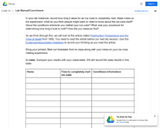
Lab Manual.
- Subject:
- Physical Science
- Material Type:
- Textbook
- Provider:
- Northern Essex Community College
- Author:
- Sarah Courchesne
- Date Added:
- 05/14/2019

Lab Manual.

This course introduces experimental chemistry for students who are not majoring in chemistry. The course covers principles and applications of chemical laboratory techniques, including preparation and analysis of chemical materials, measurement of pH, gas and liquid chromatography, visible-ultraviolet spectrophotometry, infrared spectroscopy, nuclear magnetic resonance, mass spectrometry, polarimetry, X-ray diffraction, kinetics, data analysis, and organic synthesis.
Acknowledgements
Dr. Dolhun and Dr. Hewett would like to acknowledge the contributions of past instructors over the years to the development of this course and its materials.
WARNING NOTICE
The experiments described in these materials are potentially hazardous and require a high level of safety training, special facilities and equipment, and supervision by appropriate individuals. You bear the sole responsibility, liability, and risk for the implementation of such safety procedures and measures. MIT shall have no responsibility, liability, or risk for the content or implementation of any of the material presented.
Legal Notice
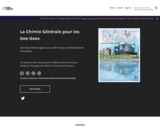
Ce manuel a été conçu pour les étudiants inscrits au cours CHM1711 Principes de chimie à l'Université d'Ottawa.

Mountain Heights Academy Leadership OER; Presented by Sally Emett

Mountain Heights Academy: Leadership OER, presented by Lisa Cox

This is an Instructional Design Technology master's program assignment. It is a learning object created by me when I was in the first semester of my program.

The learning video canvas supports the initial collection of ideas for creating a learning video. It also includes a template for a script and storyboard. It is developed by the Educational Technology team of TU Graz (Austria) as a service for teachers and course organisers at the MOOC platform iMooX.at and other learning videos as open educational resources (OER).
Ebner, Martin; Edelsbrunner, Sarah; Grigoriadis, Ypatios; Schauer, Jasmin; Schön, Sandra (2021). Learning Video Canvas: Collection of Ideas for the Learning Video. Graz: TU Graz. Published under CC BY 4.0 International. URL: https://doi.org/10.5281/zenodo.4624701, Researchgate: https://www.researchgate.net/publication/350650248_Learning_Video_Canvas_Collection_of_Ideas_for_the_Learning_Video - editable PDF: https://www.researchgate.net/publication/351083745_Editable_PDF_of_Learning_Video_Canvas_Collection_of_Ideas_for_the_Learning_Video
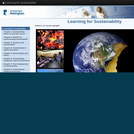
The aim of this module is to provide students with an overview of current work and debates on the subject of Sustainability. Sustainability is a complex term that can mean different things to different people depending upon their cultural and subject backgrounds, and the context within which they live and work.
Dr Sarah Speigh, University of Nottingham

A classroom icebreaker with Lego, to introduce students to each other and to the instructor. A playful way to start to get to know your students and seed a constructive classroom culture.
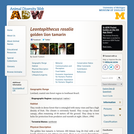
Leontopithecus rosalia: Information
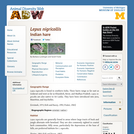
Lepus nigricollis: Information
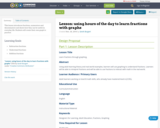
This lesson introduces fractions, numerators and denominators and shows how they can be useful in everyday life.
Students will create their own graph to practice.
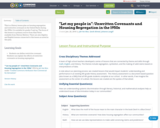
This is a History lesson plan on housing segregation and restrictive covenants in the United States during the 1950s. It is suitable for grades 9 and up. The focus of this lesson is a primary source from Alan Paton available from History Matters. There are also Algebra and English lessons connected to this lesson as noted in this plan.
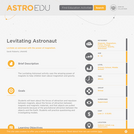
The Levitating Astronaut activity uses the amazing power of magnets to help children learn about magnetism and gravity.
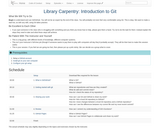
Library Carpentry lesson: An introduction to Git. What We Will Try to Do Begin to understand and use Git/GitHub. You will not be an expert by the end of the class. You will probably not even feel very comfortable using Git. This is okay. We want to make a start but, as with any skill, using Git takes practice. Be Excellent to Each Other If you spot someone in the class who is struggling with something and you think you know how to help, please give them a hand. Try not to do the task for them: instead explain the steps they need to take and what these steps will achieve. Be Patient With The Instructor and Yourself This is a big group, with different levels of knowledge, different computer systems. This isn’t your instructor’s full-time job (though if someone wants to pay them to play with computers all day they’d probably accept). They will do their best to make this session useful. This is your session. If you feel we are going too fast, then please put up a pink sticky. We can decide as a group what to cover.

Paddle Wheels. Smoke Stacks. Tow Boats. Explore life on a river boat. View images, videos and narrative describing historical and practical aspects of river boat life.
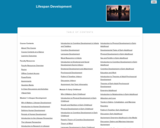
This is an updated version. Introduction to Lifespan Development (Fall 2019)
Lifespan Development examines the physical, cognitive, and socioemotional changes that occur throughout a lifetime. This course covers the essentials in understanding human development, psychological research, and theories of growth and development. Students will come to understand the lifespan perspective and to analyze growth through each of the major stages of development: prenatal development, infancy, early childhood, middle childhood, adolescence, early adulthood (including emerging adulthood), middle adulthood, and late adulthood. The course covers key topics in each of these stages, including major developmental theories, genetics, attachment, education, learning, disabilities, parenting, family life, moral development, illnesses, aging, generativity, and attitudes towards death and dying.
Faculty members may readily adapt the course’s OER content to include new developments and research to equip students with what they need to have success in their sociological journey.
Contributors
This course, based on Lifespan Psychology by Laura Overstreet, includes additional material from the Noba Project, OpenStax Psychology, and additional noteworthy contributions by the Lumen Learning team and:
Sarah Carter
Margaret Clark-Plaskie
Daniel Dickman
Tera Jones
Julie Lazzara
Stephanie Loalada
John R. Mather
Sonja Ann Miller
Nancee Ott
Jessica Traylor
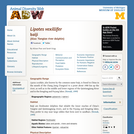
Lipotes vexillifer: Information
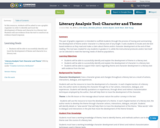
In this resource, students will be asked to use a graphic organizer in order to identify and track the development of theme and character in a literary text. Students will use evidence from the text to construct an evidence based response.